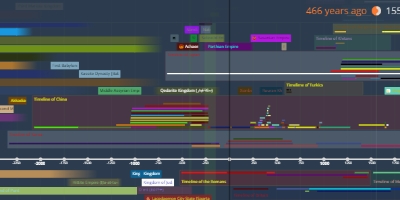Islamic State (oct 13, 2006 – mar 23, 2019)
Description:
Islamic State (official name since June 2014; abbreviated IS), at times known as the Islamic State of Iraq and the Levant (ISIL; /ˈaɪsəl, ˈaɪsɪl/), and as the Islamic State of Iraq and Syria (ISIS; /ˈaɪsɪs/), or by its Arabic acronym, Daesh (داعش, Dāʿish, IPA: [ˈdaːʕɪʃ]), was a militant Sunni Islamist group and former unrecognized quasi-state that follows a Salafi jihadist doctrine. Islamic State was founded by Abu Musab al-Zarqawi and gained global prominence in 2014 when it drove Iraqi security forces out of key cities in its Western Iraq offensive, followed by its capture of Mosul and the Sinjar massacre.IS originated in 1999, pledged allegiance to Al-Qaeda and participated in the Iraqi insurgency following the 2003 invasion of Iraq by Western forces. In June 2014, the group proclaimed itself a worldwide caliphate and began referring to itself as the Islamic State (الدولة الإسلامية ad-Dawlah al-Islāmiyah; IS). As a caliphate, it claimed religious, political, and military authority over all Muslims worldwide. Its adoption of the name Islamic State and its idea of a caliphate have been criticised, with the United Nations, various governments, and mainstream Muslim groups rejecting its statehood. In Syria, the group conducted ground attacks on both government forces and opposition factions, and by December 2015, it held an area extending from western Iraq to eastern Syria, containing an estimated eight to twelve million people, where it enforced its interpretation of sharia law. They were estimated at the time to have an annual budget of more than US$1 billion and more than 30,000 fighters.
In mid-2014, an international coalition led by the United States intervened against ISIL in Syria and Iraq with an airstrike campaign, in addition to supplying advisors, weapons, training, and supplies to ISIL's enemies in the Iraqi Security Forces and Syrian Democratic Forces. This campaign reinvigorated the latter two forces and damaged ISIL, killing tens of thousands of its troops and reducing its financial and military infrastructure. This was followed by a smaller-scale Russian intervention exclusively in Syria, in which ISIL lost thousands more fighters to airstrikes, cruise missile attacks, and other Russian military activities and had its financial base further degraded. In July 2017, the group lost control of its largest city, Mosul, to the Iraqi army, followed by the loss of its de facto political capital of Raqqa to the Syrian Democratic Forces. By December 2017, the Islamic State controlled just 2% of its maximum territory (in May 2015). In December 2017, Iraqi forces had driven the last remnants of the Islamic State underground, three years after the group captured about a third of Iraq's territory. By March 2019, ISIL lost one of their last significant territories in the Middle East in the Deir ez-Zor campaign, surrendering their "tent city" and pockets in Al-Baghuz Fawqani to the Syrian Democratic Forces after the Battle of Baghuz Fawqani.
On December 19, 2018, President Donald Trump declared that ISIS was defeated and signaled his intention to withdraw all 2,000 U.S. troops supporting the SDF in Syria. But the SDF continued its offensive and in February 2019 launched the final siege on ISIS forces in Baghouz, the last holdout. Baghouz fell on March 23, 2019, formally ending the caliphate’s claim to any territory. The mass surrender of ISIS fighters and their families illustrated the lingering challenge: how to deal with jihadists to forestall its transformation into an insurgency in Iraq and Syria. The Baghdadi era of ISIS ended on October 26, 2019, when the leader was killed in a U.S. raid in northern Syria.
The group has been designated as a terrorist organisation by the United Nations. The IS is known for its videos of beheadings and other types of executions of both soldiers and civilians, including journalists and aid workers, and its destruction of cultural heritage sites. The United Nations holds ISIL responsible for committing human rights abuses, genocide, war crimes, and crimes against humanity. The Islamic State committed genocide and ethnic cleansing on a historic scale in northern Iraq. In October 2019, IS media announced that Abu Ibrahim al-Hashimi al-Qurashi was the new leader of the Islamic State, after Abu Bakr al-Baghdadi killed himself by detonating a suicide vest during the US Barisha raid in Syria. The Islamic State has also had a presence outside the Middle East through its affiliates and various "provinces", and has been militarily active in countries including notably in Nigeria, Afghanistan and the Philippines.
Added to timeline:
Date:
oct 13, 2006
mar 23, 2019
~ 12 years
